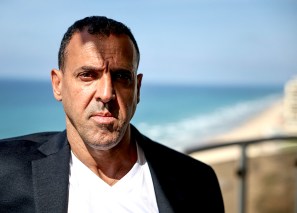In Jerusalem last week to interview the Prime Minister, Benjamin Netanyahu, I noticed several changes since my last visit 15 years ago. The first is that Israel is now quite rich. It even has its own gas and shale oil, prompting Netanyahu to tell me that he is being forced to revise his view that Moses, for all his heroic virtues, had been a ‘bad navigator’ in finding the only place in the Middle East with no natural resources. Israel used to be socialist — democratic, of course, but almost Soviet in its collectivist austerity. Today, the annual growth rate is nearly 8 per cent, even the West Bank looks smarter, and the wine, which used to be undrinkable and served in thimbles, is delicious. But the precariousness never goes away for long. We were dining on an elegant yacht in the harbour of Tel Aviv when someone’s Blackberry pinged with the news that the first Palestinian rocket attack for two years had just landed in Beersheba.
Another change, related to the end of socialism, is that the rudeness for which Israelis used to be renowned has almost disappeared. The only bad manners I encountered came from an abrupt girl at passport control. Her colleague promptly apologised: ‘She doesn’t know the right words.’
Traditionally the Charedim ultra-Orthodox have been hostile to the State of Israel, seeing Zionism as a sort of blasphemy. The religious are excused military service and, because they devote their lives to study rather than paid work, taxes. But the country has the capacity to surprise. The orthodox Rabbi Moshe Weiss took me off to his L’Zion B’rina (‘To Zion with Joy’) School near Jerusalem, which has won an award from the strictly secular Ministry of Education. The school takes Jewish children from the former Soviet Union and educates them free, teaching the Jewish roots which, because of Soviet persecution, were often forgotten. I met boys from Belorussia, Ukraine and Georgia. Remarkably for an orthodox establishment, the school gives the boys free choice of what to do with their lives. Some join the army, or other secular occupations. Perhaps because no one forces them to be, the boys are mostly devout. They have filled a large room with an architectural model they built of the Temple in biblical times. Where would the ‘Wailing’ Wall have been, I asked Rabbi Weiss. I was thrilled when he and his Principal fell into a learned dispute, neither yielding, about its precise location.
Rabbi Weiss himself makes an ingenious religious contribution to a famous secular phenomenon. He produces a successful system called Internet Ramon, which filters out all pornography. Apparently its biggest ‘uptake’ is in the Muslim world.
We flew from Tel Aviv to the Lebanese border in a tiny private helicopter. After only a few minutes, the pilot came through on the headphones. Our credit card paying for the flight had been refused, he said. It is an odd situation to be denied travel when one is in mid-air. The pilot landed at once. We found out that the clerk had taken down the expiry date wrong, and off we flew again, over Mount Tabor, where Christ was transfigured, and along the Galilean shore where he called the fishermen. From the air, you see the smallness of the place, its beauty, and its vulnerability.
Near the border, we bumped into an unusual party. A score of dark, slightly exotic-looking soldiers were gathering by the roadside. They were Bedouin, our military guide explained, from northern Galilee, part of a group who serve in the IDF as trackers. One of Hezbollah’s specialities is to plant bogus stones which disguise IEDs (bombs). These Arabs find them, and can also detect, as not even trained dogs can, when the enemy have got over the border fences using ladders specially adapted to make only the tiniest holes in the soil.
Reading Mr Netanyahu’s book A Durable Peace, I discovered that Colonel Gaddafi’s ‘manifesto’ is entitled The Third Way. I recalled that Professor Anthony Giddens, ennobled by Tony Blair, has been a frequent visitor to Libya. The London School of Economics, of which Lord Giddens is the former director, accepted £1.5 million research funding from a foundation controlled by Gaddafi’s son, Saif. Until now, Professor Giddens has been credited with inventing Mr Blair’s famous ‘Third Way’, but perhaps this is wrong. Does Blairism in fact take its rise from the thinking of the Tripoli strongman and his Great Socialist People’s Libyan Arab Jamahiriya?
As the partridge-shooting season ends in Spain, there is much shaking of heads about a notable absentee, poor young Saif. Readers of this column (Notes, 28 November 2009) will remember that, after his father’s rapprochement with the West, Saif developed a taste for shooting game, instead of (or in addition to) people, and turned up at Lord Rothschild’s Waddesdon estate in pursuit of pheasants. Sadly, he did not arrive in time to meet Cherie Blair, who was there for dinner, not the shooting, but he did coincide with Lord Mandelson of Hartlepool and Foy, then our deputy Prime Minister. Saif also shot partridge in Spain with Alejandro Agag, managing director of Queen’s Park Rangers and son-in-law of the former Spanish Prime Minister Jose-Maria Aznar; and he put down his own partridges, 40,000 of them, in the desert near Tripoli. Unfortunately, gamekeeping in Libya does not reach Norfolk standards, and half of the birds were eaten by vermin. Nevertheless, people like Mr Agag and Flavio Briatore, of Formula 1 fame, flew in and enjoyed the shoot, though complaining there were too many flies. What will become of the Tripoli partridge now? Saif’s fellow guns feel that he could have been the intermediary in the Libyan crisis and won an audience with Mrs Clinton or David Cameron if he had made the right noises at the right time. Instead, he appeared on CNN and talked about fighting to the last bullet. He blew it. Oh dear, is there any partridge shooting in Venezuela?






Comments